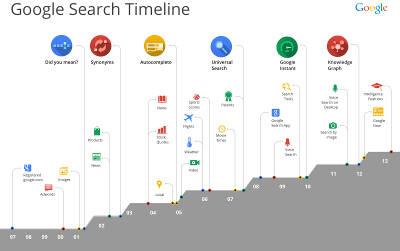| Hummingbird - A New Google Search Algorithm |
| Written by Mike James | |||
| Friday, 27 September 2013 | |||
|
Along with the celebrations for Google's 15th year of providing users with the information they are looking for, it was announced that its search algorithm had been updated. The new algorithm is called Hummingbird to signify its precision and speed. The big problem with talking about anything to do with Google's search algorithm is that, even after so long, we know very little with any certainty. The reason for the secrecy is not just to stop other search engines from copying, it's all part of the war between Google and the people who try to take advantage of features of its search algorithm to get better results than deserved.
Photo Charlesjsharp It is true that Google started out with a clever idea - Page Rank - which it was quite happy to share with the world. Today PageRank is just one of the ingredients of the process of picking pages. A whole set of "signals" are used to try to match which page to return in response to a search and Google says that Page Rank is just one among many and perhaps not even the most important. The point is that after Page Rank Google hasn't really been that clear on how it performs ranking on pages within its search algorithm. Now we have the announcement of the most important update in more than three years. When Google updates its search algorithm, generally there are people complaining. The reason is that there are winners and losers and the winners don't say anything but the losers tend to be vocal. After the previous update to the Caffeine algorithm there were lots of complaints because of downgrading, since the updated algorithm was designed to remove websites that were clearly trying to bias the search results in their favour and hence you might expect trouble. However, any change in Google's algorithm is likely to be controversial. One way around this problem is for Google not to actually say when the up-date occurred. Google will only say vaguely that it upgraded a few weeks ago and others such as the BBC use the phrase "for about a month". Looking at search traffic from Google in I Programmer's stats reveals a very clear step change of a bit more than 30% on the July 15, 2013. If you examine Alexa figures for others websites that provide news and technical reviews you are likely to find that the same distinct jump in traffic occurred. Although this evidence isn't conclusive, it seems reasonable to suppose that Hummingbird was rolled out starting on Monday June 15th. Google says that Hummingbird now effects 90% of search responses and also looking at traffic charts it seems that the rollout was gradual over the following few weeks. What Hummingbird is designed to do, even if we can't know how, is to move away from simple-minded keyword Boolean searches to returning results to semantic queries. In other words, in the past if you typed "How high is the Eiffel Tower" the words "How", "is" and "the" would probably have been discarded as nuisance words and the search would have produced results based on keyword frequencies of "Eiffel", "Tower" and "high". Now Hummingbird is claimed to take the whole phrase and attempt to return pages that might have ranked low on a simple keyword count but actually answer the question. In this sense it is an extension of Google's Knowledge graph that aims to categorize knowledge in a more human way than a simple index. What this means is that as users we probably need to upgrade the way we enter queries. If you are a programmer then don't just enter the keywords in your query as a shortcut because typing something more meaningful might just get you better results. For the website owner all you can do is hope that quality will be rewarded by an automatic grading process that you are permitted to know nothing at all about. Google also demonstrated a few new ideas at the celebration event held in the Menlo Park, California, garage where Larry Page and Sergey Brin started the company 15 years ago. They have even restored the old office they shared with a period computer and a dialup link. You can see it all in the video they made:
And if you missed anything there is a timeline showing what the company thinks are important steps.
Google's Search Timeline (click for larger version)
Hummingbird might be a step in the right direction. Clearly in the long term search has to make use of AI to provide a fully semantic query system that becomes much more like the sci-fi dreams of a computer that can answer any question. Search engines are just one step on the way to a general AI system. As Amit Singhal, SVP of Google Search, puts it: "We’ll keep improving Google Search so it does a little bit more of the hard work for you. This means giving you the best possible answers, making it easy to have a conversation and helping out before you even have to ask. Hopefully, we’ll save you a few minutes of hassle each day. So keep asking Google tougher questions—it keeps us on our toes! After all, we’re just getting started. "
More InformationFifteen years on—and we’re just getting started Related ArticlesGoogle Search Goes Semantic - The Knowledge Graph Google Needs a New Search Algorithm Google's War On Links - Prohibition All Over Again Adblocking - Looking For A Solution Google Explains How AI Photo Search Works Google Announces Advanced Power Searching Course
To be informed about new articles on I Programmer, install the I Programmer Toolbar, subscribe to the RSS feed, follow us on, Twitter, Facebook, Google+ or Linkedin, or sign up for our weekly newsletter.
Comments
or email your comment to: comments@i-programmer.info
|
|||
| Last Updated ( Saturday, 28 September 2013 ) |



